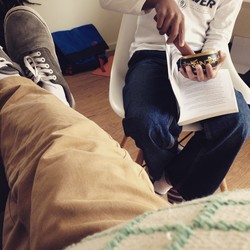 Teaching an 11 year old about using the bell during our mindfulness moment Teaching an 11 year old about using the bell during our mindfulness moment During a session last night with a young male with Autism and learning differences, we did our regular “Mindfulness Moment” using one the apps I like to use. Of course there are times that we would practice mindfulness on our own but come on, it’s the 21st Century and some of these apps are incredible! He completed his five-minute meditation and I asked him what had happened (he was wearing incredible, sound proof Bose headphones so I couldn't hear). He said that the focus was on Joy. He was asked to think joyous thoughts for one person that he respected, one person he felt neutral about and one person he despised. I asked who he picked. He said that he felt joy for me and struggled thinking nicely about two kids in class who had been picking on him this week. He said, however, that while he was breathing he could feel his anger begin to boil towards them but, in this particulate moment, felt that he could breathe it out, let go and not take it personally. Earlier this week I had another person in to see me struggling with life with drug abuse and a history of trauma from when he was a small child. We meditated together for our first ten minutes as he said that he was not feeling his best today. At 13, I was impressed that he was able to voice this. After the session we talked about how drugs can become our safety blanket, giving us that sense of safety that we are craving but struggle to find in healthy ways. I asked him if there were times that he did not feel like using. He said that when he is with long-term friends from his childhood that do not use, during our sessions and during certain classes at school. While investigating this he said that all these places make him feel safe and not on edge. Both of these young people were experiencing a difficulty and were able to ride it out without resorting to a patterned negative coping skill such as lashing out, ignoring the feeling or seeking something pleasure such as drugs or alcohol. Instead, we sat together with that emotion and both the intensity and duration of the experience diminished. When working with parents I speak regularly about Dr Bruce Perry’s Three R’s and how they can help guide us to knowing what next to do. Instead of diving into a discussion about bullies or the harmful effects of drug abuse, both of these young people courageously resolved an inner conflict using mindfulness and by sitting with their difficulty. I speak often about how important relationship is to psychotherapy and these are two good examples of why. Together, we were able to create an environment of safety and together, we experienced a challenging feeling and worked with it. This success has a better chance of repeating than does a pamphlet or worksheet. We experienced it working. Experiencing these successes is key and I thank mindfulness for it. I’m now preparing for a session with a young person interested in yoga. I’m sure there is another blog coming soon.
0 Comments
Leave a Reply. |
Contact WillE: [email protected] Archives
September 2019
Categories |
 RSS Feed
RSS Feed
